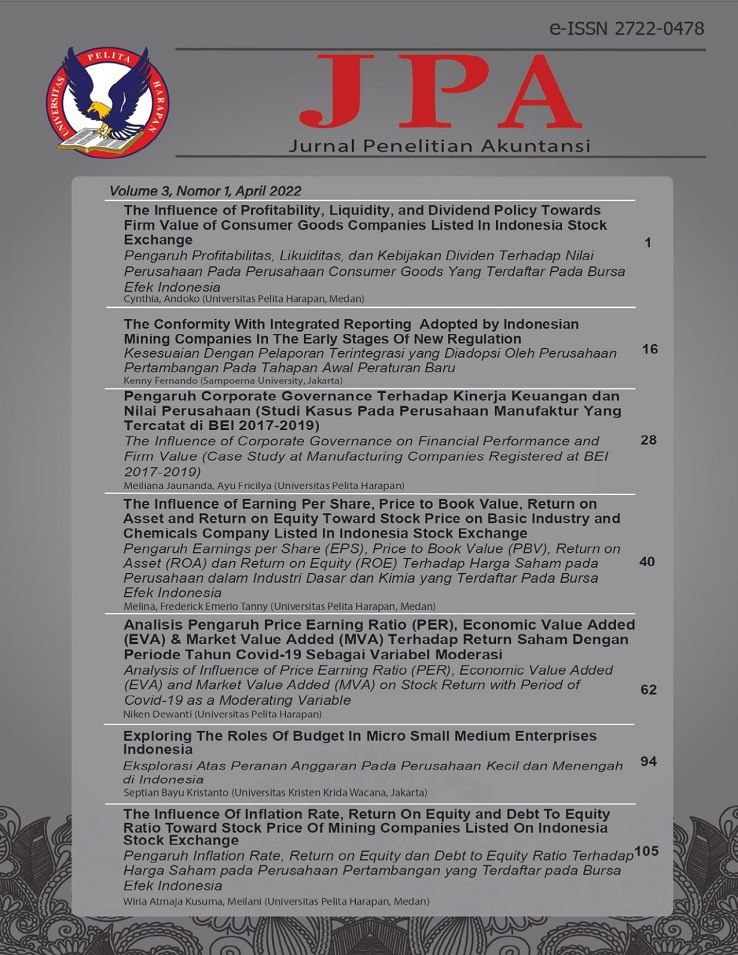THE CONFORMITY WITH INTEGRATED REPORTING ADOPTED BY INDONESIAN MINING COMPANIES IN THE EARLY STAGES OF NEW REGULATION
Keywords:
Corporate reporting, integrated reporting, sustainability information.Abstract
Sustainability has become a pivotal issue ever since the world’s environment has started declining. The economic aspect no longer stands alone; it must be accompanied by social and environmental aspects. Companies earn profit by ensuring that their operations always add value to the community (including global sustainability development), which eventually affects their stakeholders. This paper highlights an alternative means of communicating what companies have accomplished through integrated reporting (initiated by the International Integrated Reporting Council), which emphasizes value creation for the short, medium, and long term. By assessing such documents, we found that the Indonesian regulation in reporting and the International Integrated Reporting Framework fulfilled 40% and 90%, respectively, of the information needed by stakeholders. Another 22% was accounted for by reconciling both regulatory documents. Surprisingly, we found that seven LQ45 mining companies have exceeded the required information by half in conforming to international regulations.
References
BAPEPAM-LK (2012). Keputusan Ketua Badan Pengawas Pasar Modal dan Lembaga Keuangan Nomor: KEP-431/BL/2012 - Peraturan Bapepam dan LK Nomor X.K.6. Available at http://www.bapepam.go.id/pasar_modal/regulasi_pm/peraturan_pm /X/X.K.6.pdf, on 12 September 2017.
Ernst and Young. (2012). Excellent in integrated reporting awards 2012. South Africa: Ernst and Young.
Freeman, R. E. (1984). Strategic management: A stakeholder approach. Boston.
Glaser, B., & Strauss, A. (1967). The discovery of grounded theory. Aldine Publishing Company. Hawthorne, New York.
Ho, L. J., & Taylor, M. E. (2007). An empirical analysis of triple bottom”line reporting and its determinants: evidence from the United States and Japan. Journal of International Financial Management & Accounting, 18(2), 123-150.
King Report, The “King III”. (2009), King Report on governance for south africa. South Africa: Institute of Directors in South Africa.
KPMG. (2012). Integrated reporting: Performance insight through better business reporting. Swiss: KPMG International.
Maunders, K. T., & Foley, B. J. (1984). Information disclosure and the role of the accountant in collective bargaining””some comments. Accounting, Organizations and Society, 9(1), 99-106.
Rosengren, K.E. (1981). Advances in Scandinavia Content Analysis: An introduction. In KE Rosengren (Ed.), Advances in content analysis. Beverly Hills, CA: Sage.
Simnett, R., & Huggins, A. L. (2015). Integrated reporting and assurance: where can research add value? Sustainability Accounting, Management and Policy Journal, 6(1), 29-53.
Schreuder, H. (1979). Corporate social reporting in the Federal Republic of Germany: An overview. Accounting, Organizations and Society, 4(1), 109-122.
The International Integrated Reporting Council. (2013). The international integrated reporting framework. United of Kingdom: The IIRC.
The International Integrated Reporting Council. (2013). Business and investors explore the sustainability perspective of integrated reporting. United of Kingdom: The IIRC.
Weber, R.P. (1990). Basic content analysis. Beverly Hills, CA: Sage.
Downloads
Published
Issue
Section
License
Authors who publish with this journal agree to the following terms:
1) Authors retain copyright and grant the journal right of first publication with the work simultaneously licensed under a Creative Commons Attribution License (CC-BY-SA 4.0) that allows others to share the work with an acknowledgement of the work's authorship and initial publication in this journal.
2) Authors are able to enter into separate, additional contractual arrangements for the non-exclusive distribution of the journal's published version of the work (e.g., post it to an institutional repository or publish it in a book), with an acknowledgement of its initial publication in this journal.
3) Authors are permitted and encouraged to post their work online (e.g., in institutional repositories or on their website). The final published PDF should be used and bibliographic details that credit the publication in this journal should be included.


